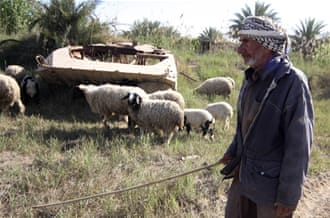Checklist: Obama returns to the Middle East |
|
On his first presidential visit to the region since 2009 Cairo speech, we evaluate US progress on key policy pledges.
Gregg Carlstrom
Last Modified: 21 Mar 2013 06:45
|

Not only is this Barack Obama's first visit to Israel since taking office - it is his first trip back to the Middle East since his much-hyped "address to the Muslim world" in Cairo in 2009.
He has done a mixed job implementing the promises he made in that speech. His pledge to pursue an Israeli-Palestinian peace deal "with all the patience that the task requires" has largely evaporated, and he will say little on the subject while in Jerusalem and Ramallah, according to the White House. And his promise of a new beginning in relations with the Arab world has been overtaken by events; US policy in the region is still largely focused on stability.
Below is a summary of the main promises Obama made on his trip to Cairo. He has made progress on the issues where he can act unilaterally: boosting aid and exchange programmes, for example, or ending the war in Iraq. But he has accomplished little on the diplomatic front, or in terms of ending torture and other US policies which have sparked so much anger across the region.
-
Withdraw US troops from Afghanistan
A complete withdrawal is years, if not decades away.
The size of the US force in Afghanistan has more than doubled since Obama took office, from around 40,000 when he took office to a peak of about 100,000. Those numbers have been declining, though, as the US nears a planned withdrawal at the end of 2014.
Still, the US plans to leave a residual force of perhaps 10,000 troops in Afghanistan indefinitely; they will be tasked primarily with targeting al-Qaeda members in the country, a seemingly open-ended commitment.
- Afghanistan and Pakistan
Invest billions in economic development in Afghanistan and Pakistan
The White House has vastly expanded its aid to Pakistan, pledging $7.5bn over five years in civilian aid, a fulfillment of Obama's pledge in Cairo.
The two countries launched a "strategic dialogue" in Washington in 2010, and have held a series of high-level meetings since. Money from the US has already been earmarked for a number of projects in Pakistan, including new hospitals, water infrastructure and agricultural investments.
-
End the war in Iraq
This is an unequivocal "yes," though much of the credit is due to the Bush administration, which in 2008 signed the status-of-forces agreement that required all US troops to leave Iraq by the end of 2011.
-
Prohibit torture and close the Guantanamo Bay prison
Obama issued an executive order just days after taking office which required interrogations be conducted in accordance with the US army field manual, which prohibits many forms of abuse.
But he has not barred some policies widely held to be a form of torture - keeping detainees in solitary confinement for long periods, for example. Nor has he repudiated the practice of "rendition," where suspects are sent for interrogation to foreign countries with lax human rights standards; several news reports have documented the continued use of "black sites," secret prisons in Somalia and perhaps elsewhere.
And there has been no accountability for the officials who condoned torture under the Bush administration. Obama's newly-confirmed CIA director, John Brennan, has been accused of complicity in abusive interrogations.
-
Demand an end to Israeli settlement growth
Obama has repeatedly urged Israel to stop building settlements, and his pressure helped bring about a 10-month settlement freeze announced in late 2009 -- though calling it a "freeze" is a bit generous, because hundreds of new homes were built during that period.
But despite all the public pronouncements, Obama has not forced Israel to choose between its settlements and its relationship with the United States. He has not threatened any consequences for their continued growth.
Even when the Israeli government publicly humiliated vice president Joe Biden, by announcing 1,600 new settler homes hours after Biden landed in Jerusalem for a visit, the only response was to deprive Netanyahu of a photo op on a visit to the White House several weeks later. The incident was quickly forgotten.
-
Pursue Israeli-Palestinian peace
Obama has done less on this issue than his predecessors. There has been no "Obama peace plan," no counterpart to Oslo or Wye River or the "road map."
He did broker a high-profile meeting in September 2010 with Israeli prime minister Binyamin Netanyahu, Palestinian Authority president Mahmoud Abbas, and the leaders of Egypt and Jordan. The summit was meant to restart direct negotiations between the Israelis and Palestinians, and it did, for less than a month. But when the temporary settlement freeze expired at the end of September and Netanyahu refused to renew it, the Palestinians withdrew from the talks, and they have not resumed since.
-
Support education, science, technology and health programmes in the region
The US has done a number of things to fulfill this pledge. Exchange programmes in Muslim-majority countries have increased by 30 percent since Obama took office; the US state department also created a programme that allows American high school students to spend a semester or a full year abroad in Muslim-majority countries.
US embassies in individual countries have also set up lower-level efforts. In Qatar, for example, the embassy runs a "sister schools" programme that pairs US and Qatari high schools.
And in late 2009, the White House announced the Global Technology and Innovation Fund, which provides between $25m and $150m to "catalyze and facilitate private sector investments that promote access to and growth of technology ... throughout Asia, the Middle East and Africa". The administration also dispatched three "science envoys" to Muslim-majority countries in north Africa and southeast Asia.






















